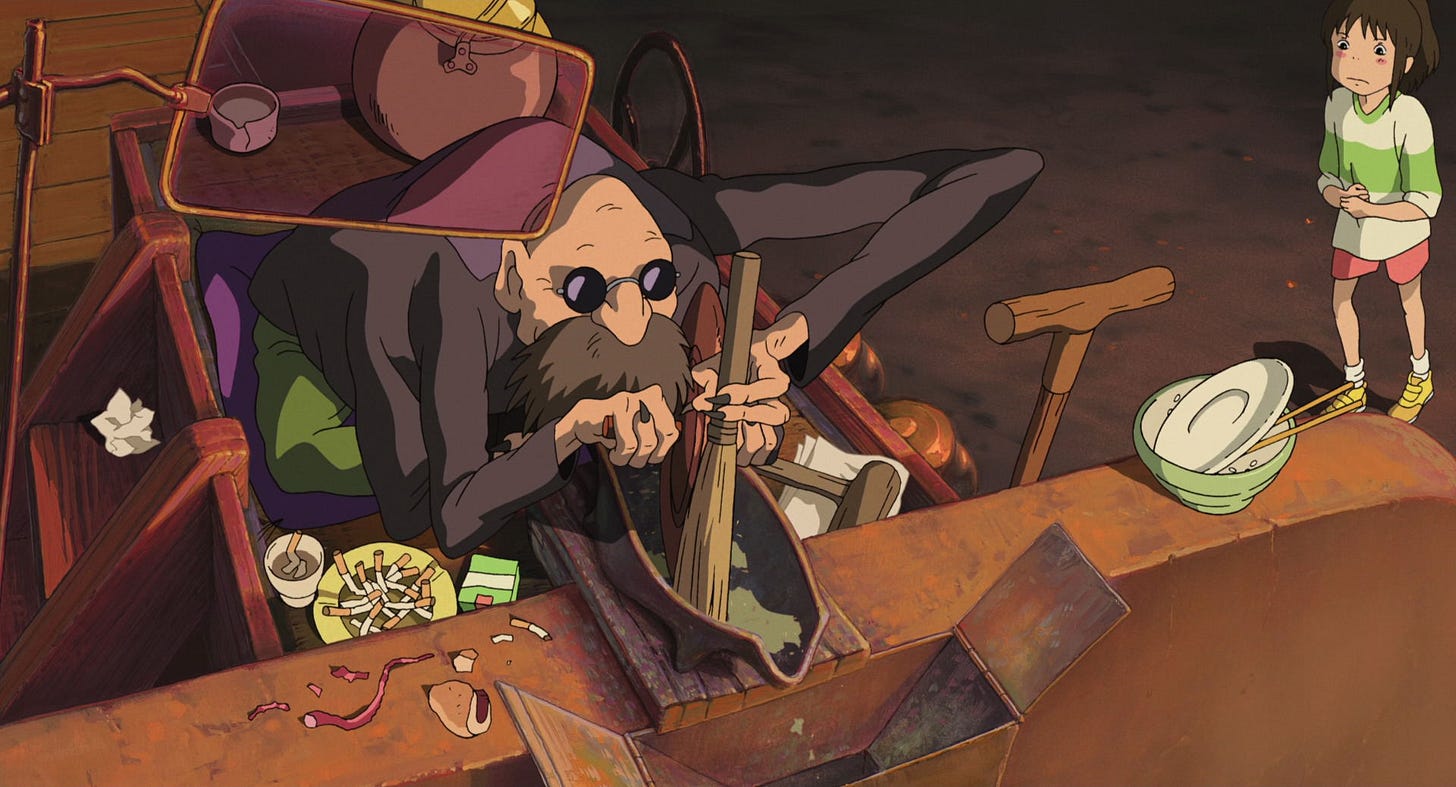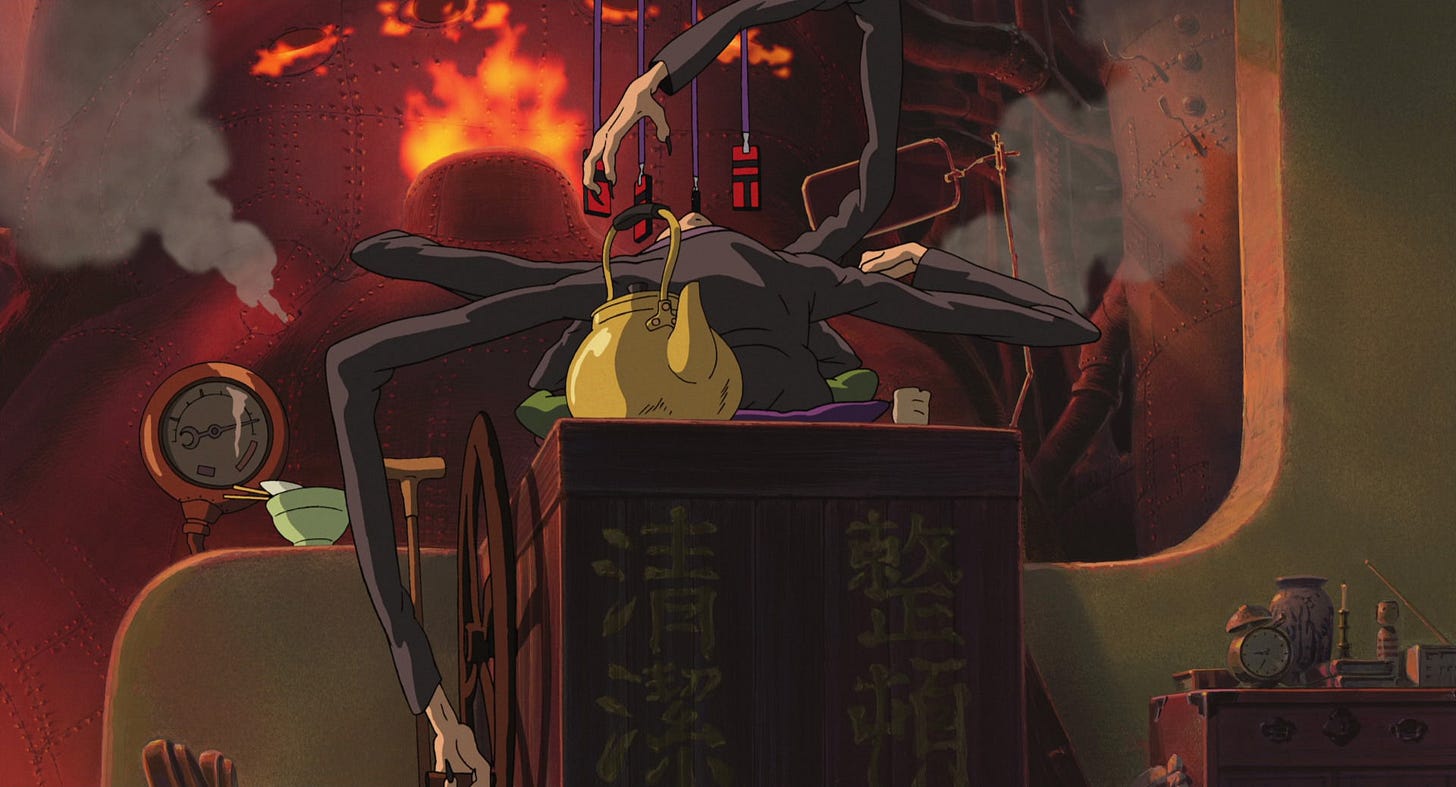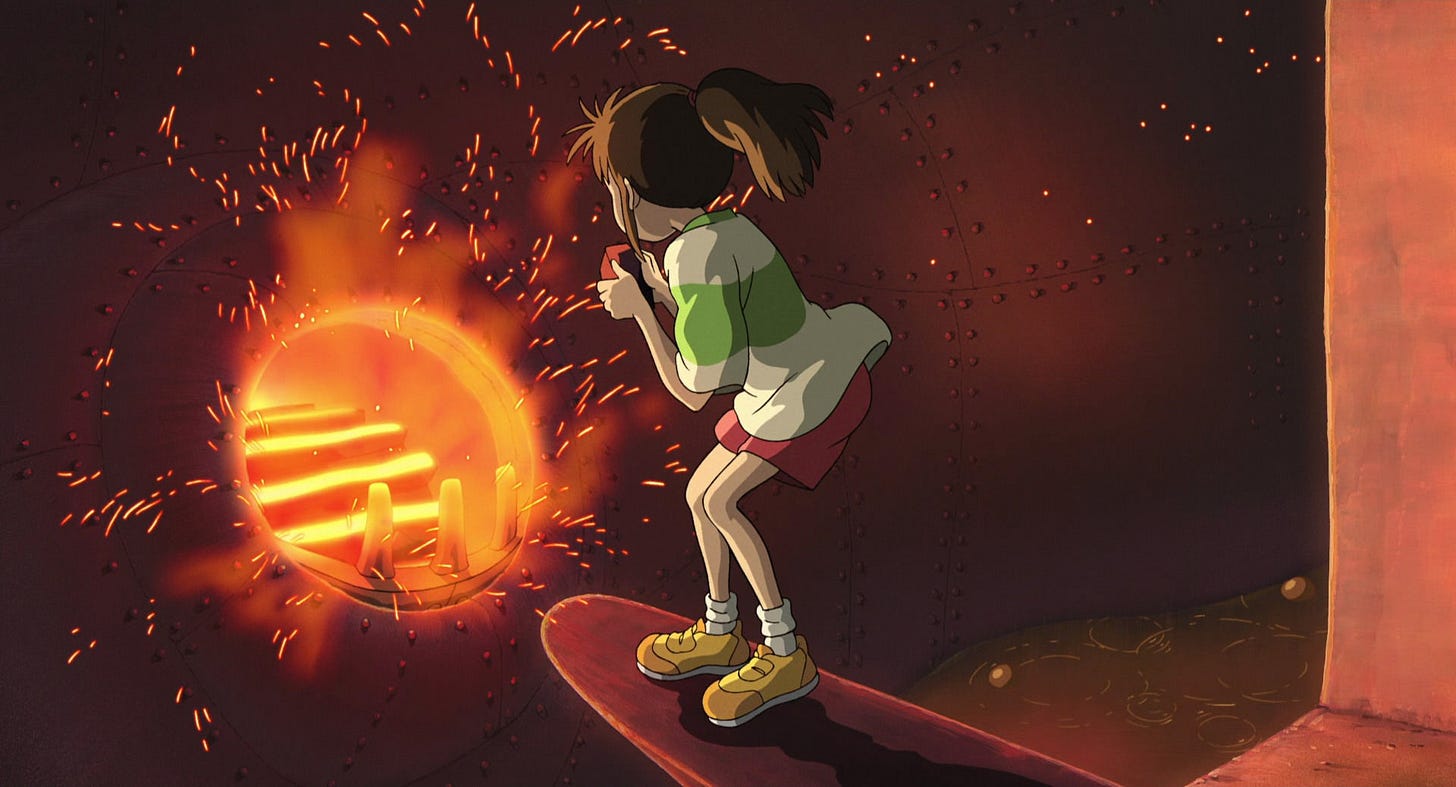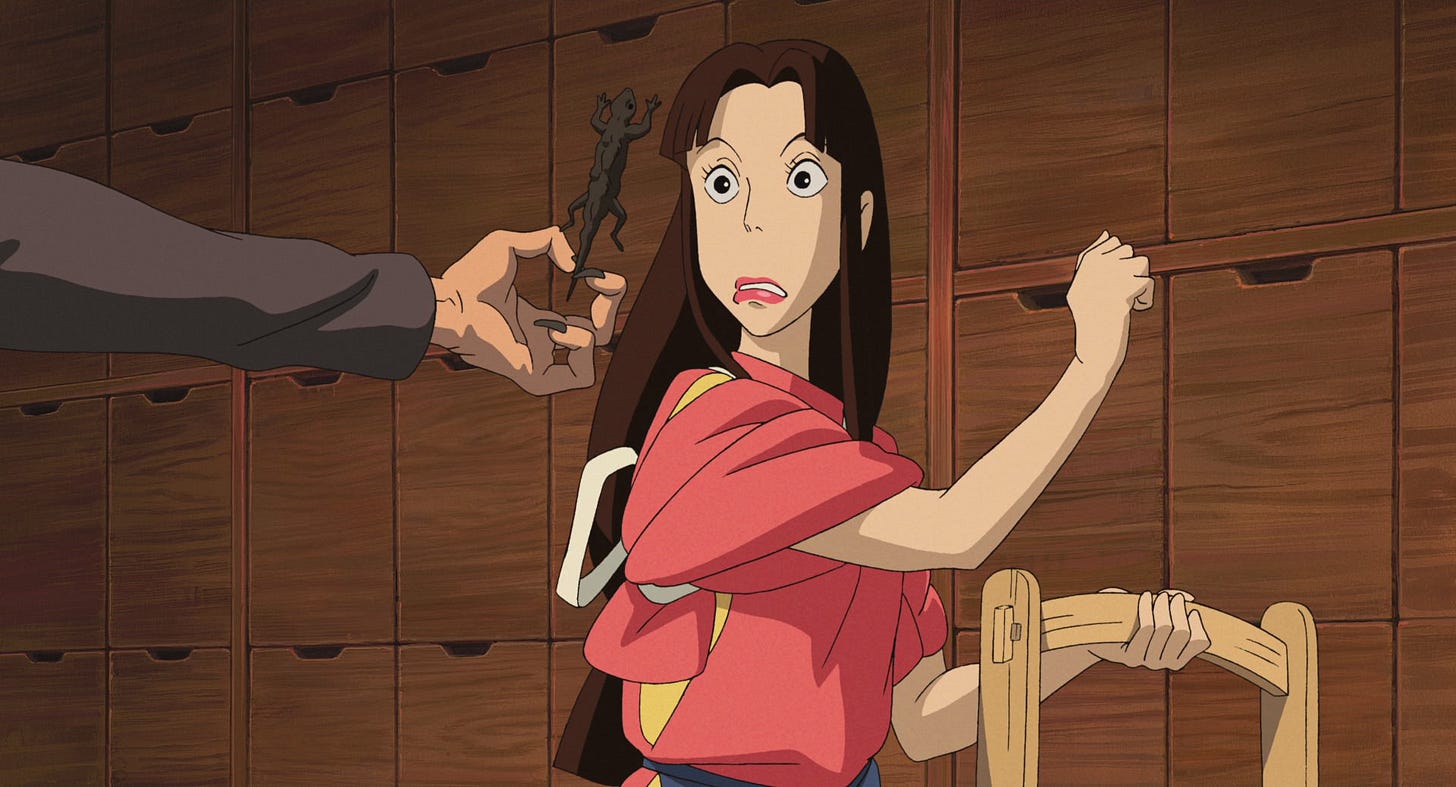Welcome to Falling Sand. We invite you to slow down, listen deeply, and rediscover the mystery of a world spoken into being.
Illumine our hearts, Lord.
In the name of the Father, Son, Holy Spirit.
Amen.
Let us begin.
The Alchemy of Kamaji
In our last Spirited Away post, we further explored the Shō (development.) Continuing in this stage, we DESCEND down into the bathhouse’s underbelly.
Chihiro climbs down rickety stairs and ventures into the boiler room. It’s run by Kamaji, an enigmatic, six-armed furnace operator. It is his job to keep a steady supply of hot water for the bathhouse above. (As seen in the screen cap above, it seems Kamaji relies on a steady supply of caffeine and nicotine to stay fueled. Obvious sign of a hustler. Real recognize real.)
In short, Kamaji is a fire worker. Here, the symbolism turns heavily alchemical.
In alchemy, the athanor is the name of the furnace used to slowly and consistently heat materials for transmutation. It is the womb of change where impurity is burned off and base matter becomes gold. As we touched on in a previous post, gold is—alchemically speaking—the solid form of light.
Kamaji’s subterranean boiler room can be seen as this athanor. It is a hidden furnace continually fed by coal and operated by mysterious forces (soot spirits). It is not explosive, emotional, or singular. Rather, it is steady, ritualized, slow transformation.
This aligns with the Orthodox vision of the spiritual life which is likewise slow, liturgical, and sacramental. This is not a fantastic flash of light, this is the fire that never goes out. Transformation happens through the Eucharist, confession, prayer, and ascetic struggle.
This is Kamaji’s world. The fire here is humble, hidden, and constant. His soot spirits labor with small pieces of coal. These are not glamorous or spectacular, but without them, the bathhouse stops, the spirits go unclean, and the mystery dies.
By contrast, modern evangelical spirituality often prizes immediacy, feeling, and visible results. Worship is designed to stir the heart and bring about an emotional “encounter,” spiritual highs are interpreted as signs of divine presence or favor, and testimony culture focuses on radical before-and-after moments. I grew up in this tradition and have no doubt that these experiences are often sincere, but they resemble flash fires—bright, hot, but unsustainable. This often leads to disillusionment when the feelings fade, when no new encounter comes, or when emotional dryness sets in. Without the liturgical scaffolding and sacramental regularity of the ancient path which was laid stone by stone by Christ and the apostles, a person can come to feel spiritually abandoned.
The Orthodox path isn’t always felt, but it’s always there. This is slow, kenotic, self-emptying—coal after coal, prayer after prayer, confession after confession. This is Chihiro’s path. She doesn’t fall out during an alter call, pray on a mountaintop, or dance in ecstasy. Rather, she lifts coal, she cleans filth, she controls her stomach and her tongue.
This is how true gold is formed.
Elder of Fire
Kamaji isn’t friendly at first. He’s gruff, mechanical, seemingly indifferent to Chihiro’s fear. But beneath his brusque exterior lies a deeper mystery. He is an orderer of chaos, maintaining the bathhouse from the furnace room below.
Kamaji’s name roughly translates to “boiler man,’ but that barely scratches the surface. He appears to be part-man, part-spider—a multi-limbed being who moves with eerie precision. His arms stretch impossibly far to control valves, wheels, pulleys, and burners all at once. In traditional Japanese mythos, Kamaji can be seen as the yokai—household spirits of fire and machinery—or even oni—with their connection to fire, underworld spaces, and fearsome labor. But when viewed through the cosmic, fractal lens of Christianity, Kamaji becomes far more.
We already touched on how Kamaji tends the athanor. His entire being is structured around this patient work. His six arms suggest mastery, efficiency, and spiritual power. In many traditions, including Hindu-Buddhism, multiple arms signal divine or enlightened capability. His spider-like form links him to fate and weaving. He’s like a world-weaver, creating unseen threads that support the ordered surface above. He is also one of silent wisdom. He observes more than he speaks. This aligns him with the elder monk who has tamed the passions. After all, those who know the most often speak the least.
Kamaji is no simple maintenance worker. Rather, he is an elder of fire. Like the angel of the Lord walking with the Three Youths in the fire, he is the presence of wisdom and transformation in the place of trial. So too, Kamaji’s fire isn’t destructive. Rather, it’s formative. It burns but does not consume. (cf. Exodus 3:2, Acts 2:3, Isaiah 6:6-7, 1 Cor. 3:13, 2 Kings 2:11.)
Carrying Coal
Chihiro has stumbled down the stairs and into the boiler room. This is her descent. One that is both physical but spiritual. She’s frightened, alone, unsure what to do next.
Then something small, comedic, and seemingly mundane happens: a soot sprite collapses under the weight of its coal lump. Chihiro picks it up. At first she doesn’t know what to do with it once it’s in her hands. She is a child and therefore a stranger to work. She asks:
“What should I do with it? Should I leave it here?”
And here—for me—we find the most striking and moving line of dialogue. Kamji, never letting up from his work, turns his head and says:
“Finish what you started, human.”
It’s a deceptively simple line—one easy to overlook, but it evokes an extreme pivot in the narrative. At the surface, it’s a command: don’t interfere halfway. But beneath that, it echoes something far more ancient and weighty. The life of transformation is always cooperative: God’s grace initiates, but the human must respond. This synergy (synergeia) demands proper response. Here, Kamaji is saying, If you’re going to carry the coal, carry it all the way. If you’re going to serve, serve fully.
In that moment, Chihiro is invited to commit. Not to a massive, heroic task—but to the humble, unseen completion of a small act of mercy and love. This is exactly how theosis begins.
And she does. Though the weight is extremely heavy, she doesn’t complain. She carries it to the furnace. And that single action breaks the pattern. Kamaji grunts. He’s been watching her all this time. It’s all been a sort of test and it seems Chihiro has passed. Something in Kamaji’s manner changes He has recognized something in the girl. Not ambition, but humility—a willingness to carry another’s burden.
But what happens when the other soot sprites see Chihiro carrying the load for one of their comrades? They immediately drop their own loads and feign distress, hoping she’ll carry theirs too. It’s a moment that plays comically on screen, but symbolically, it cuts deep. This is a quiet commentary on human nature, labor, and the heart. The moment we see someone else pick up the burden, our own temptation to evade it awakens. This is the danger of vicarious virtue—letting someone else do the hard, hidden work while we drift into passivity. This is becoming increasingly difficult in our modern world.
We’ve become a culture of spectators. Sports are watched far more than they’re played. Megachurches are built like stadiums, with tiered seating and IMAX-sized screens. Even watching strangers play video games is now a cultural norm. Every day, participation is replaced more and more with passive consumption.
This scene is also a meditation on how the soul can respond to compassion. Rather than being inspired by Chihiro’s help, the soot sprites are tempted to exploit it. Grace can be misunderstood. Kindness and charity can become a loophole.
But Kamaji cuts through this:
“Hey, you runts. Want to turn back to soot?”
This is more than a line about sprites. It is a cosmic truth. Without active participation, we dissolve. We return to chaos. In Christian terms, we fall out of synergy with God’s grace. Theosis isn’t magic. It requires the repetitive lifting of coal to feed the fire. In this view, work is not meritorious or punitive. Rather, it shapes being. To refuse it is to return to the soot from which we came, to become nothing.
Godparent & Guide
It is now that Kamaji intervenes.
Not out of sentimentality, nor because Chihiro begged, bribed, or properly performed. Rather, because she participated. Kamaji calls to the bathhouse worker, Lin, and offers her a dried newt in exchange for her help.
In Japanese folklore, newts are tied to transformation and hidden magic. In alchemy, newts are fire-spirits—creatures born of flame. The gift of the newt acts as a token from the alchemical world. It’s funny, yes, but also sacred.
But Kamaji doesn’t only offer the newt, he also lies for Chihiro, claiming she’s his granddaughter. Symbolically, this is no small moment. In this new world, Chihiro has gained a godparent.
In Orthodox Christian practice, a godparent stands witness at baptism, vouching for the one entering the Church, promising to help guide them in faith. That’s what Kamaji does. He vouches. He intercedes. He makes space. And he does all of this without ever stopping his work. He remains faithful to the furnace, even as he opens the way for Chihiro. There is something deeply monastic about this. He is like the desert father who continues weaving his basket while offering spiritual direction in a few cryptic words.
Lin protests at first, of course. She’s rough around the edges, suspicious of strangers, and annoyed at being dragged into trouble. But the newt is too valuable to pass up and Kamaji’s quiet authority carries weight. Eventually, with a roll of her eyes and grunt of reluctant approval, she agrees. And just like that, Chihiro has a both a godparent and a guide.
She has descended. She has labored. She has chosen to carry the weight. Now, the path to the next mystery opens. Lin leads her toward the upper chambers—toward Yubaba, the name-taker and contract-keeper. But the Chihiro that rises up the elevators is not the same girl that descended down the stairs. That girl has died in the fiery furnace. A new girl is being born. Chihiro has begun the slow, unseen work of becoming.







